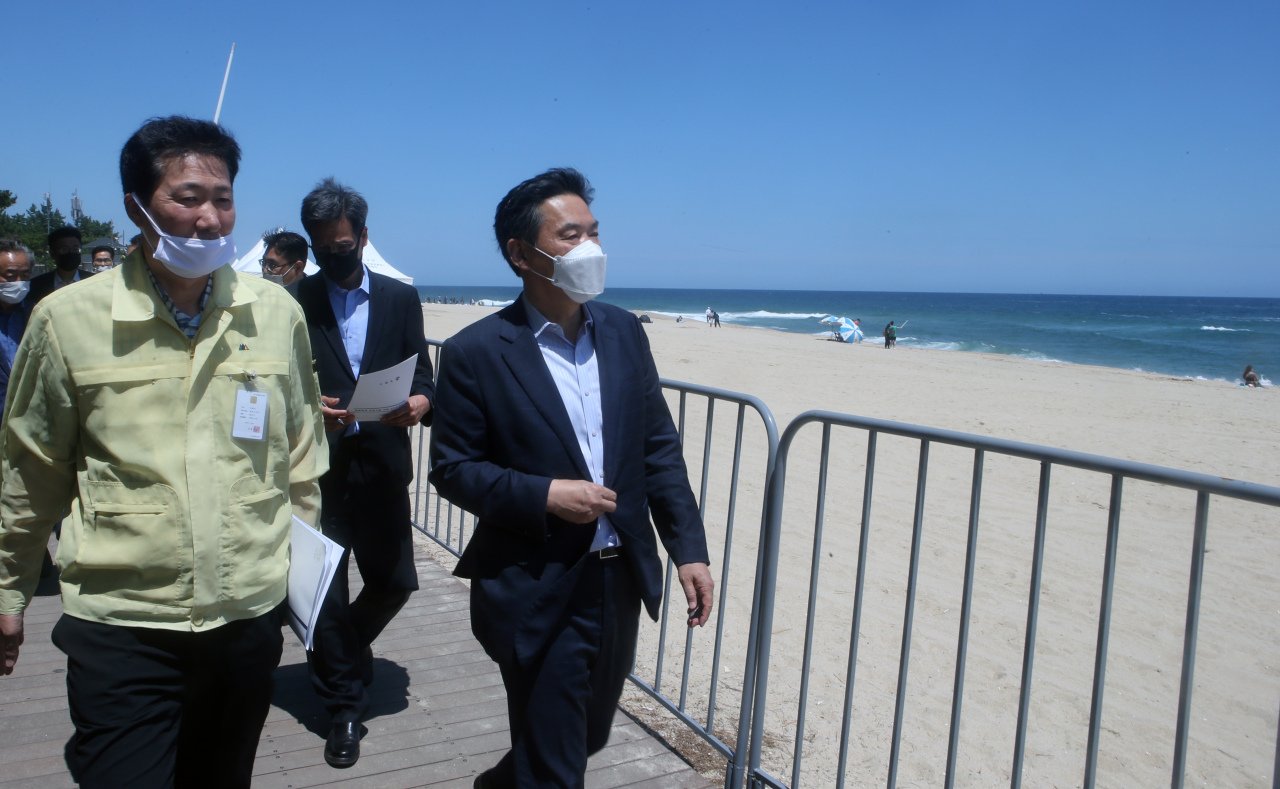Holiday destinations wary of vacationers bringing virus with them
Yet another Jeju visitor travels while symptomatic, sickens four
By Kim ArinPublished : July 19, 2020 - 11:00

More Koreans are choosing to travel within their own borders this summer holiday, as the pandemic rages on, putting local tourist hot spots on alert over vacationers flocking there and potentially bringing the novel coronavirus with them.
Among the popular destinations are Jeju and the North and South Jeolla Provinces, which have the fewest reported coronavirus cases -- each under 40 -- in the country. Seaside towns say they are seeing their resorts and beaches packed with vacation crowds, undaunted by the ongoing outbreaks.
A 32-year-old Seoulite who works in insurance said he was planning on a domestic getaway this summer as many countries still have travel restrictions in place. “Even if I went somewhere where the restrictions are lifted, the 14-day isolation is still mandatory upon returning -- which makes heading overseas too inconvenient,” he said.
This renewed interest in domestic tourism is expected to remedy some damages suffered by local businesses over the past months when tourists were kept away and consumer spending dropped. But the wave of summer vacationers is not altogether welcomed at the receiving end in coronavirus times.
On Friday, a Seoul woman in her 70s was diagnosed with the virus after traveling to Jeju Island to see family there. Her six-day itinerary included a bathhouse, a cafe and a barbecue restaurant, over the course of which she had come into close contact with at least 60 people and has infected four to date.
Investigations revealed she had not been wearing a face mask and that she failed to socially distance while showing symptoms such as a cough and fever. Authorities believe she was able to pass through airport security on fever reducers.
For those in Jeju, she is not the first outsider to come infected and startle the relatively coronavirus-free region. The island accounts for less than 1 percent of the national total cases at only 25.
Jeju Province Gov. Won Hee-ryong said in a Friday briefing that municipalities should be informing their residents about traveling responsibly amid the coronavirus outbreaks.
“If your community is experiencing a lot of active cases, you should think twice before deciding to travel -- even if you aren’t showing symptoms at the moment, you are still able to pass on the disease to others. Do not travel if you are sick, or have been around someone who is,” he said.
In March and June, Won filed complaints against three visitors who had toured the island province in spite of having symptoms. “Travelers who don’t report symptoms pose threats to public health and need to be held accountable,” he said.
Speaking about vacation safety, Minister of Health and Welfare Park Neung-hoo said in a Sunday briefing that wearing face masks significantly reduces one’s chances of both catching and transmitting the coronavirus.
“Epidemiological investigations have shown those with face masks were far less likely to get sick when in contact with a patient,” he said.
Korea reported 34 new coronavirus cases in the last 24 hours ending Saturday midnight, raising the total to 13,745. Of the newly confirmed cases, 21 were locally transmitted and 13 were imported.
The number of imported cases totaled 421 during the first three weeks of July, which is about 3.8 times the figure seen last month. The rise in travel-related cases has left quarantine lodgings occupied at over 80 percent capacity as of Friday afternoon.
Health authorities say the growing number of cases tied to international travel is attributable to the deepening pandemic. The global coronavirus count posted a record single-day increase of nearly 260,000 on Saturday, according to the World Health Organization’s situation report.
Park said border measures ensured most infections from abroad are screened before entering the country. “As Korea requires anyone arriving here to be tested and to quarantine for two weeks, most with the virus are detected before they are able to spread it,” he said.
By Kim Arin (arin@heraldcorp.com)






![[From the Scene] Monks, Buddhists hail return of remains of Buddhas](http://res.heraldm.com/phpwas/restmb_idxmake.php?idx=644&simg=/content/image/2024/04/19/20240419050617_0.jpg&u=20240419175937)





![[Graphic News] French bulldog most popular breed in US, Maltese most popular in Korea](http://res.heraldm.com/phpwas/restmb_idxmake.php?idx=644&simg=/content/image/2024/04/18/20240418050864_0.gif&u=)



![[From the Scene] Monks, Buddhists hail return of remains of Buddhas](http://res.heraldm.com/phpwas/restmb_idxmake.php?idx=652&simg=/content/image/2024/04/19/20240419050617_0.jpg&u=20240419175937)

![[KH Explains] Hyundai's full hybrid edge to pay off amid slow transition to pure EVs](http://res.heraldm.com/phpwas/restmb_idxmake.php?idx=652&simg=/content/image/2024/04/18/20240418050645_0.jpg&u=20240419100350)

![[Today’s K-pop] Illit drops debut single remix](http://res.heraldm.com/phpwas/restmb_idxmake.php?idx=642&simg=/content/image/2024/04/19/20240419050612_0.jpg&u=)